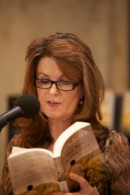Total Lockdown
The Republic of Ireland is in virtual lockdown until April 12th, at the earliest. And people of my age are “cocooned.” Theatres, pubs and many stores closed. It is a scary time but we haven't lost our interest in literature or our sense of humour. Ireland’s greatest literary festival Listowel Writers’ Week has been canceled. It was great to read about two of its stalwart contributors still in the news.
Saint Patrick’s Day parades over the island were canceled and veteran writer Mary Kenny, in the Irish Independent treated us to a few lesser known facts about our national apostle. For instance she discovered that Saint Patrick was deemed to be the founder of Irish literature. The oldest surviving text penned in Ireland was written by Saint Patrick in the fifth century. The saint wrote in Latin so his text was called a littera from which we get the word “letter” in English and “Litir” in Irish.
 |
As a child Christine Dwyer Hickey (see pic below) spent much time with her father and often accompanied him to the races. She used those experiences in her 1991 short story, "Across the Excellent Grass" which won the Powers Gold Short Story Competition at Listowel Writers’ Week. She won the same competition the following year with "Birdie’s Wedding" and was also a prize winner in The Observer/short story competition with "Teatro La Fenice."
 |
I first met the author in Listowel and it was always evident that she would go places as a writer. Her Dublin Trilogy was published between 1995-2000 as "The Dancer, The Gambler and The Gatemaker" by Marino Books and was republished by New Island in 2006-07. The trilogy tells the story of a Dublin family between the years 1913-1958. Her novel Tatty published in 2004 has been chosen as the Dublin One City One Book for city 2020.
Alison Lyons, a director of UNESCO City of Literature explains the principle behind Dublin One City One Book, “To shine a light on a particular book, to make sure it’s widely available through the library system and to encourage reading of it with lots of free events themed around the story and the author.”
In this case the author and the work are closely related. Christine explains that when started to write Tatty she was doing it,” . . . as a sort of exercise in therapy to help me get my head around my complicated childhood which after my father’s death had come back to haunt me.”
* * * * *
Despite the lockdown inter-county rivalry hasn’t died a death. The following dialogue between two Meath man was overheard at a wake in Nobber.
“I hear a Cavan man is after getting’ the virus.”
“Well there’s one thing certain, he won’t give it to anyone. I heard of a couple in Mullahoran, during the lockdown an’ they were watching Mass on the television. When it came to the collection they turned it off.”
* * * * *
Social Distancing is not a new phenomenon. It’s a long time since I encountered it first. It was a harvest night in 1969. I was parallel with the perpendicular outside the Marquee in Poulaphouca with a young one (well she wasn’t that young!) The Parish Priest came on the scene and, in a stentorian voice, commanded, “You should be two feet apart.” “Be God Father” says I “I’m here for the past twenty minutes trying to get her two feet apart.”
It would appear that some young people are not taking the advice of experts seriously. I’m doing my best to stay alive anyway. Because, in the words of the late John B. Keane, “A dead man is no good to anyone except undertakers and propagandists.”
* * * * *
It was Mother‘s Day here in Ireland. Mary Adair had reminded me that the deadline was imminent. I was sitting there trying to come up with something appropriate. Then it struck me. Why not use Patrick Kavanagh’s poem,
Of a Monaghan graveyard; I see
You walking down a lane among the poplars
On your way to the station, or happily
Going to second Mass on a summer Sunday
You meet me and you say:
‘Don’t forget to see about the cattle – ‘
Among your earthiest words the angels stray.
And I think of you walking along a headland
Of green oats in June,
So full of repose, so rich with life –
And I see us meeting at the end of a town.
On a fair day by accident, after
The bargains are all made and we can walk
Together through the shops and stalls and markets
Free in the oriental streets of thought.
O you are not lying in the wet clay,
For it is a harvest evening now and we
Are piling up the ricks against the moonlight
And you smile up at us – eternally.
* * * * *
I saw the following in the Social and Personal section of a provincial newspaper.
“Single man with toilet rolls would like to meet female with hand sanitiser . . . for good clean fun.”
* * * * *
We are told that we should turn our stumbling blocks into stepping stones. We now have a major stumbling block and converting it into a stepping stone will be difficult. But we can do our best.

|
See you in May.






No comments:
Post a Comment